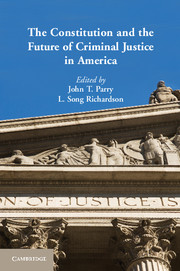Book contents
- Frontmatter
- Contents
- Contributors
- Acknowledgments
- Introduction
- Part I Foundations – The Scope of Criminal Law and Access to Counsel
- 1 The Past and Future of the Right to an Attorney for Poor People Accused of Crimes
- 2 Criminal Justice in America
- Part II Race and Criminal Procedure
- Part III Policing and Privacy
- Part IV Technology and the Surveillance Society
- Part V Confessions and miranda
- Part VI Conviction, Sentencing, and Incarceration
- Part VII Emergencies and Borders – Immigration, Terrorism, National Security, and Transnational Crime
- Index
- References
2 - Criminal Justice in America
Constitutionalization without Foundation
Published online by Cambridge University Press: 05 June 2014
- Frontmatter
- Contents
- Contributors
- Acknowledgments
- Introduction
- Part I Foundations – The Scope of Criminal Law and Access to Counsel
- 1 The Past and Future of the Right to an Attorney for Poor People Accused of Crimes
- 2 Criminal Justice in America
- Part II Race and Criminal Procedure
- Part III Policing and Privacy
- Part IV Technology and the Surveillance Society
- Part V Confessions and miranda
- Part VI Conviction, Sentencing, and Incarceration
- Part VII Emergencies and Borders – Immigration, Terrorism, National Security, and Transnational Crime
- Index
- References
Summary
Criminal justice in America lacks foundation in three senses: historical, political, and substantive. The U.S. Constitution will continue to fail to place meaningful limits on American penal power without a radical reconceptualization of the challenge of state punishment in a modern democracy, that is, ultimately as a fundamental question of political legitimacy. This question was not framed in American constitutional history, as neither the American Revolution nor the Civil War generated any interest in the legitimacy of punishment in a self-governing polity, in stark contrast to the continental Enlightenment, which seized on punishment as the most drastic, most visible, and most tangible manifestation of state power. Instead, attention in the United States was limited to procedural aspects of the exercise of the state’s penal power, that is, to secondary questions of application, rather than to the fundamental question of legitimacy, to the how, not to the whether.
To put it differently, and more precisely, what is needed is not a fundamental reconceptualization of the challenge of state punishment in a supposedly self-governing polity, but a conceptualization of that challenge in the first place. The search for historical foundations of the legitimation of American criminal justice reveals an absence, rather than an insufficient presence. There is no account of American criminal justice as justice, and more specifically as justice in a political community that regards self-government, or autonomy, as the touchstone of political legitimacy. Without such an account, a constitutional law of American criminal justice would itself be without foundation; a constitutional criminal law would have no principles of criminal justice to stand on.
- Type
- Chapter
- Information
- Publisher: Cambridge University PressPrint publication year: 2013



